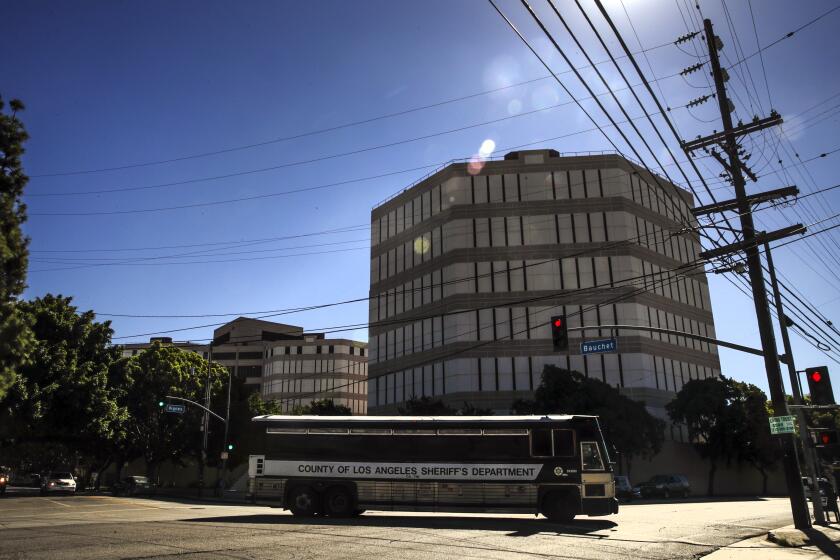L.A. County courts to severely limit use of cash bail

Los Angeles County’s courts will dramatically scale back the use of cash bail in all but the most serious criminal cases later this year, according to new bail policies unveiled Tuesday.
As of Oct. 1, virtually all defendants accused of misdemeanors or nonviolent felonies in L.A. County will either be cited and released or freed on certain terms and conditions after judicial review within 24 hours of arrest, according to L.A. County Presiding Judge Samantha Jessner.
“A person’s ability to pay a large sum of money should not be the determining factor in deciding whether that person, who is presumed innocent, stays in jail before trial or is released,” Jessner said in a statement. “Any determination of an arrestee’s status after arrest but before being charged should be based on an individualized determination of risk and likelihood to return to court. A low-risk arrestee should not be held in jail simply because they cannot post the necessary funds to be released pending arraignment.”
The decision comes approximately two months after Judge Lawrence Riff granted a preliminary injunction in a lawsuit aimed at ending the use of cash bail to hold people in jails operated by the Los Angeles police and sheriff’s departments. Several of the plaintiffs in that suit were held in Men’s Central Jail, the ancient holding facility in downtown L.A. where many defendants await trial in abysmal conditions. Since January, 22 prisoners have died in the jail, including at least two deaths by suicide.
‘We have to do better,’ said Supervisor Hilda Solis, who spearheaded the motion to ensure inmates have warmer clothes.
Cash bail has been a controversial issue in Los Angeles and around the country in recent years, with criminal justice reform advocates often arguing for pretrial release to be dependent on an individual’s criminal history and personal situation as opposed to an arbitrary dollar amount. After L.A. County instituted a zero-bail policy for many offenses during the pandemic in order to lower the populations of prisons and jails, some police officials argued those policies led to increases in recidivism and crime. But a report to the Board of Supervisors last year showed re-arrest and failure to appear rates remained relatively static during the time the zero-bail policy was in place.
Under the new misdemeanor schedule, almost all defendants will either be cited and released, or freed without bail after their case is reviewed by a judge, who can institute other nonfinancial conditions of release such as electronic monitoring or home supervision by probation officials.
For the record:
8:34 a.m. July 20, 2023An earlier version of this story reported that people on parole or who had already had their pretrial release terms set by a judge would not be eligible for the county’s new zero-bail schedule a second time. Those people will be barred from cite-and-release programs upon a second arrest, but can still be set free pretrial, without bail, by a judge, according to a spokesperson for the Superior Court.
A judge will be available to make those determinations at all hours, seven days a week, Jessner said. Defendants arrested while out on parole or supervised release will not be eligible to be cited and released, and would instead face judicial review, according to Jessner.
The few misdemeanor offenses that will still require cash bail for release include stalking, domestic battery and violation of a protective order, according to the new schedule.
Defendants accused of murder, manslaughter, rape and most types of assault will still face hefty cash bail amounts, according to the court. Felonies including human trafficking, battery on a peace officer and sex with a minor will trigger a judicial review, according to the new schedule.
Jessner said she hoped the revised bail schedule would ensure defendants return to court without the need to place them in the county’s crumbling jails, where defendants are often injured or lose job opportunities while detained.
“For low-risk attendees pretrial release decisions that are based on risk and an individualized determination improve public and victim safety and ensure the appearance of an arrestee at court and trial,” she said.
More to Read
Sign up for Essential California
The most important California stories and recommendations in your inbox every morning.
You may occasionally receive promotional content from the Los Angeles Times.











